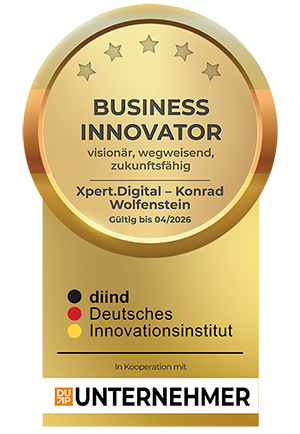Artificial Intelligence – The key to successful integration: Building interdisciplinary AI competence teams instead of isolated AI experts
Published on: August 1, 2024 / Update from: August 1, 2024 - Author: Konrad Wolfenstein

Artificial intelligence in operations: Why teams are more successful than lone fighters - Image: Xpert.Digital
🌟 Success through collaboration: Interdisciplinary teams in AI implementation
🛠️🏆 There is often a significant gap between top management's enthusiasm for artificial intelligence (AI) and its actual acceptance in everyday operations. The most effective way to close this gap is to establish comprehensive AI competence teams that work closely with the respective departments instead of individual AI experts.
In times of technological change, innovative strategies, such as those developed by Xpert.Digital, offer valuable support to promote the acceptance of new technologies within the company. But many companies make the mistake of rushing to appoint someone responsible for AI at management level, believing that they have sufficiently covered the topic. However, this can only be truly successful if the introduction of AI is widespread across all employee levels.
🚀 The problem of introducing new technologies
The technology adoption process usually begins with informing management of new technological developments. This often leads to a phase of euphoria in which company management outlines a variety of use cases - optimistic and yet often contradictory. In the enthusiasm of the first hour, the responsibility for implementation is often given to one person, but in isolation they can quickly become overwhelmed.
Many companies know this scenario all too well: the difficulties in interacting between technological innovations and operational processes quickly lead to disillusionment. It is particularly difficult that a single AI expert is not integrated deeply enough into everyday processes to always develop practical and economically sensible solutions.
🔑 AI competence teams as the key to successful integration
The solution lies in the formation of AI competence teams that combine both technical know-how from the affected departments and specialized AI knowledge. A central operational AI unit acts as a provider of the necessary platforms, data and governance guidelines. However, the implementation and support of the AI projects is the responsibility of the departments themselves, which assume the corresponding responsibility.
This approach offers decisive advantages: innovations and new technologies are widely integrated into the organization and thus become an integral part of everyday operations. In contrast to the traditional top-down approach, in which projects are often started ambitiously and then buried without a sound shortly afterwards, the competence team model creates a sustainable culture of innovation.
🏆 Examples from practice
In practice, it has been shown that companies that rely on a broad AI competence team are significantly more successful. A particularly impressive example comes from the automotive industry. A leading manufacturer recognized early on that AI and machine learning offer enormous potential to optimize production processes and improve product quality. Instead of just naming a single person responsible for AI, it was decided to form interdisciplinary teams. These consisted of production engineers, data scientists and IT specialists.
Thanks to this approach, the company was able to develop tailor-made AI solutions that were precisely tailored to the needs of the production lines. The results were impressive: significant increases in efficiency and significant reductions in production costs, coupled with a measurable improvement in product quality.
👥 Focus on the human component
Another key to success is not to neglect the human component. Innovations will only be accepted if the workforce is convinced that they actually offer added value. This works best when employees are involved in the development process from the start. Regular training and open lines of communication can address concerns at an early stage and promote a positive attitude towards new technologies.
Especially when introducing AI, it is important to take employees’ reservations and fears seriously. That AI could replace jobs is a widespread concern. Companies must create transparency here and show ways in which AI can support and facilitate people's work instead of replacing them.
🌟 Overcome resistance and challenges
Of course, there will always be resistance and challenges when new technologies are introduced. Coping with this requires foresight and sensitivity. It is important that not only technical, but above all cultural aspects are taken into account. A deep understanding of operational processes as well as employee needs and fears is essential to ensure a successful implementation.
The financial sector offers another example. A large banking institution decided to use AI to improve customer service. However, the ambitious project initially stalled due to the skepticism of customer advisors who saw their role threatened. Only through targeted workshops and the integration of consultants into the development of new AI-supported tools could this skepticism be reduced. Consultants realized that AI could help them work more efficiently and focus on more complex consultations instead of wasting time on routine tasks.
📈 More efficient and future-proof working world
The integration of AI into companies is still in its early stages and the potential is enormous. Companies that recognize the opportunities and challenges and deploy well-thought-out, interdisciplinary competence teams have the best chance of being successful in the long term. Ultimately, it's about creating a learning organization that is open to change and in which innovations are not only tolerated but actively encouraged.
By forming competence teams and involving the entire workforce, acceptance is not only increased, but the company's innovative strength is also sustainably strengthened. Only if technology and human know-how go hand in hand will it be possible to develop the full power of artificial intelligence and anchor it in practice. This means that AI does not become a threat, but rather an opportunity for a better, more efficient and future-proof working world.
📣 Similar topics
- 🚀 The importance of interdisciplinary teams in AI implementation
- 🤖 Artificial intelligence in the workplace: Together for success
- 👥 AI competency teams: The key to corporate innovation
- 🔄 Between euphoria and reality: AI in everyday work
- 🤝 Employee integration: Overcoming resistance when introducing new technologies
- 💡 Innovative and future-proof: increasing efficiency through AI and teamwork
- 🔍 The role of AI competence teams in modern companies
- 📊 From theory to practice: successful AI implementation in operations
- 🛠️ Practical examples of successful integration of AI
- 🌟 Man and machine: Together for a better and sustainable working world
#️⃣ Hashtags: #ArtificialIntelligence #Teamwork #TechnologyAcceptance #Innovation #FutureProof
🚀🕶️🤖 The acceptance of the introduction of new technologies such as AI, extended & augmented reality and how this can be promoted

The acceptance in companies of new tools and methods in administration, sales/sales and marketing with AI, extended & augmented reality, etc. - Image: Xpert.Digital
The introduction of new technologies into companies is an increasingly relevant aspect of modern business strategies. As companies strive to remain competitive in an ever-changing digital landscape, the adoption rate of such innovations is critical to their success. But what is the general level of acceptance when introducing new technologies and tools in various company areas such as administration, sales/sales and marketing?
More about it here:
Our recommendation: 🌍 Limitless reach 🔗 Networked 🌐 Multilingual 💪 Strong sales: 💡 Authentic with strategy 🚀 Innovation meets 🧠 Intuition
At a time when a company's digital presence determines its success, the challenge is how to make this presence authentic, individual and far-reaching. Xpert.Digital offers an innovative solution that positions itself as an intersection between an industry hub, a blog and a brand ambassador. It combines the advantages of communication and sales channels in a single platform and enables publication in 18 different languages. The cooperation with partner portals and the possibility of publishing articles on Google News and a press distribution list with around 8,000 journalists and readers maximize the reach and visibility of the content. This represents an essential factor in external sales & marketing (SMarketing).
More about it here:
🚀 Building AI competence teams: A key to the successful integration of artificial intelligence in the company
💡 Management’s enthusiasm for artificial intelligence
Management's enthusiasm for artificial intelligence (AI) is often great. AI promises increased efficiency, reduced costs and new business opportunities. However, the actual acceptance and integration of these technologies often fails in everyday operations. This discrepancy highlights the need for a new approach: the creation of interdisciplinary AI competence teams that combine both specialist knowledge and AI expertise.
🔝 Traditionally, many companies follow a top-down approach
Traditionally, many companies take a top-down approach, in which experts develop AI solutions and then try to integrate them into the existing company structure. However, this approach is often met with resistance because it does not take into account the individual needs and knowledge of employees. Interdisciplinary AI competence teams, on the other hand, rely on collaboration and combine the specialized knowledge of the respective departments with the technical expertise of AI experts.
🚗 An example of this is the automotive industry
An example of this is the automotive industry, where the shift towards autonomous vehicles requires the formation of such teams. Engineers with in-depth knowledge of automotive technology work closely with data scientists and AI specialists to develop practical and safe solutions. In the financial industry, collaboration between financial analysts and AI experts enables the development of more precise risk models and tailored financial products.
🧑🤝🧑 A crucial factor in the success of these teams is the involvement of the workforce
A crucial factor for the success of these teams is the involvement of the workforce. Employees must not only feel comfortable with the new technologies, but also be actively involved in the development and implementation process. This requires an appropriate corporate culture that promotes openness and a willingness to change. Cultural factors play a central role in the acceptance of AI. Training and ongoing education as well as transparent communication about the benefits and impacts of AI are essential.
🌐 Nevertheless, challenges remain
Nevertheless, challenges remain. Many employees fear for their jobs or see the additional workload that comes with the introduction of new technologies. This requires empathy and clear, understandable explanations from management. It is important to focus on the human element and give employees the support and security they need to adapt to new circumstances.
🔑 In the long term, companies that successfully integrate AI are doing well
In the long term, companies that successfully integrate AI will do well. Building AI competence teams could be the key to overcoming the discrepancy between technological progress and operational reality. The future belongs to those companies that not only adopt technologies, but also empower their workforce to effectively use and continually develop these technologies. The involvement and empowerment of employees in the innovation process is therefore essential for sustainable success in the constantly evolving digital world.
📣 Similar topics
- 🤖 Building AI competence teams for corporate success
- 💡 Interdisciplinary teams as drivers of innovation in the AI world
- 👥 Employee participation: The key to successful AI integration
- 🚗 AI and automotive industry: synergy of engineers and data scientists
- 📊 Financial industry and AI: More precise risk models through teamwork
- 🔄 Top-down vs. Collaboration: The Shift in AI Strategy
- 🛡️ Challenges of AI integration: employee fears and empathy
- 📣 Promote cultural change: openness and further training in the AI context
- 🔧 Practical approaches to successfully implementing AI technologies
- 🌟 The future of work: turning employees into AI champions
#️⃣ Hashtags: #Employee Participation #Culture Change #Interdisciplinary Teams #KIIntegration #TechnologyStrategy
We are there for you - advice - planning - implementation - project management
☑️ SME support in strategy, consulting, planning and implementation
☑️ Creation or realignment of the digital strategy and digitalization
☑️ Expansion and optimization of international sales processes
☑️ Global & Digital B2B trading platforms
☑️ Pioneer Business Development
I would be happy to serve as your personal advisor.
You can contact me by filling out the contact form below or simply call me on +49 89 89 674 804 (Munich) .
I'm looking forward to our joint project.
Xpert.Digital - Konrad Wolfenstein
Xpert.Digital is a hub for industry with a focus on digitalization, mechanical engineering, logistics/intralogistics and photovoltaics.
With our 360° business development solution, we support well-known companies from new business to after sales.
Market intelligence, smarketing, marketing automation, content development, PR, mail campaigns, personalized social media and lead nurturing are part of our digital tools.
You can find out more at: www.xpert.digital - www.xpert.solar - www.xpert.plus

























